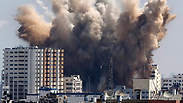
IDF strike in Gaza during Operation Protective Edge
צילום: AP
Israel stands to lose from boycotting UN commission
Op-ed: Israel must maximize opportunity to present evidence of its efforts to avoid disproportionate damage to Palestinian civilians in Gaza.
The State of Israel is facing the fact that the United Nations Human Rights Council has appointed an independent international commission of inquiry, which will be chaired by Prof. William Schabas.
The committee has been given a mandate to look into the violations of humanitarian international law and the "violation of human rights in the occupied Palestinian territories" from June 13. The Israeli government is required to decide whether to cooperate with the commission or not.
As part of the decision to appoint the commission, the UNHRC is taking a one-sided stance harshly condemning Israel, while determining that it has seriously and systematically violated human rights and attacked civilians in a collective punishment.
The UNHRC failed to mention Hamas' actions – the acts of terror, the terror tunnels and the launching of thousands of rockets – and only condemned the killing of two Israeli civilians by rocket as a minor detail.
Moreover, the man selected to head the commission, Prof. William Schabas, had voiced his strong support in the past – under his academic hat – for prosecuting Israelis in the International Criminal Court in The Hague over Israel's policy towards the Palestinians. Schabas even noted that he would rather prosecute Israeli Prime Minister Benjamin Netanyahu than former British prime minister Tony Blair.
The UNHRC has 47 member states, including an overwhelming majority of countries from Asia, South America and Africa, most of which have voted against Israel. The European countries, whose foreign ministers supported Israel's right to defend itself, chose to abstain, and the United States was the only country to vote against the commission.
The UNHRC's decision is political, and must be distinguished from expert or legal decisions. UN High Commissioner for Human Rights Navi Pillay and the UNHRC's special representatives, which are independent experts, condemned Hamas' acts too, not just Israel's.
It should be noted that all the Security Council elements addressed the state's activity in all the occupied Palestinian territories, including the West Bank, while referring to the illegal settlement expansion and the Palestinians' right to oppose the occupation.
The Schabas Committee is committed to rule under the norms of international law, which determine that attacks must only be directed at military targets and that the collateral damage caused to civilians must not be disproportionate.
The material published by the defense establishment during the fighting reveals that it has collected evidence on which it can base its claims on the legality of the army's actions in Gaza. The evidence includes aerial photos of strike targets, the cancellation of attacks when there was a concern that they would cause disproportionate damage to civilians, and death tolls which include a high percentage of men at the age of fighting.
Some issues remain controversial, however. For example, there is a need to show that the Hamas leaders' homes which were targeted were used for military activity. Even in cases in which the damage to civilians appears disproportionate, the question is whether it was a result of a human error or of irresponsible disregard to the danger to civilians.
In light of all this, should Israel cooperate and present the defense establishment's evidence to the Schabas Commission? In the case of the Goldstone Commission, I believed that the State of Israel's decision not to formally report to the committee was justified in order to avoid creating a symmetry between Israel and Hamas as a litigator.
In the case of the Schabas Commission, however, there is no room for this argument as Hamas is not a litigator. Moreover, the experience accumulated by Israel from presenting evidence by remote control to the Goldstone Commission without showing up does not demonstrate that this method is a successful one. After all, Goldstone himself regretted the part of the factual decisions he made when he served as the commission's chairman.
Israel has too much to lose if it fails to maximize the opportunity to present the evidence it has in order to prove its efforts to avoid disproportionate damage to Palestinian civilians in Gaza. Why even if Israel chooses not to show up, the commission will still publish its decision and Israel's failure to show up will not reduce the impact of the decision on the global public opinion.
In addition, beyond deciding whether it should to report to the Schabas Commission or not, under humanitarian international law Israel must establish its own independent commission of inquiry to probe reliable accusations of humanitarian violations.
Fulfilling this duty is important on two levels. On the international level, when a state demonstrates that it is capable of engaging in self-examination, prosecuting and punishing as required, it blocks the authority to judge the actions of its political leaders and soldiers in the International Criminal Court or in most countries with a universal authority.
On the national level, it's important for Israel to reject non-humanitarian actions when they are revealed, thereby stating that they are taking place against its policy and violating the morality of the IDF, which is so important for the soldiers risking their lives in order to protect it.
Prof. Frances Raday is chair of the Concord Research Institute for Integration of International Law in Israel at the College of Management.










